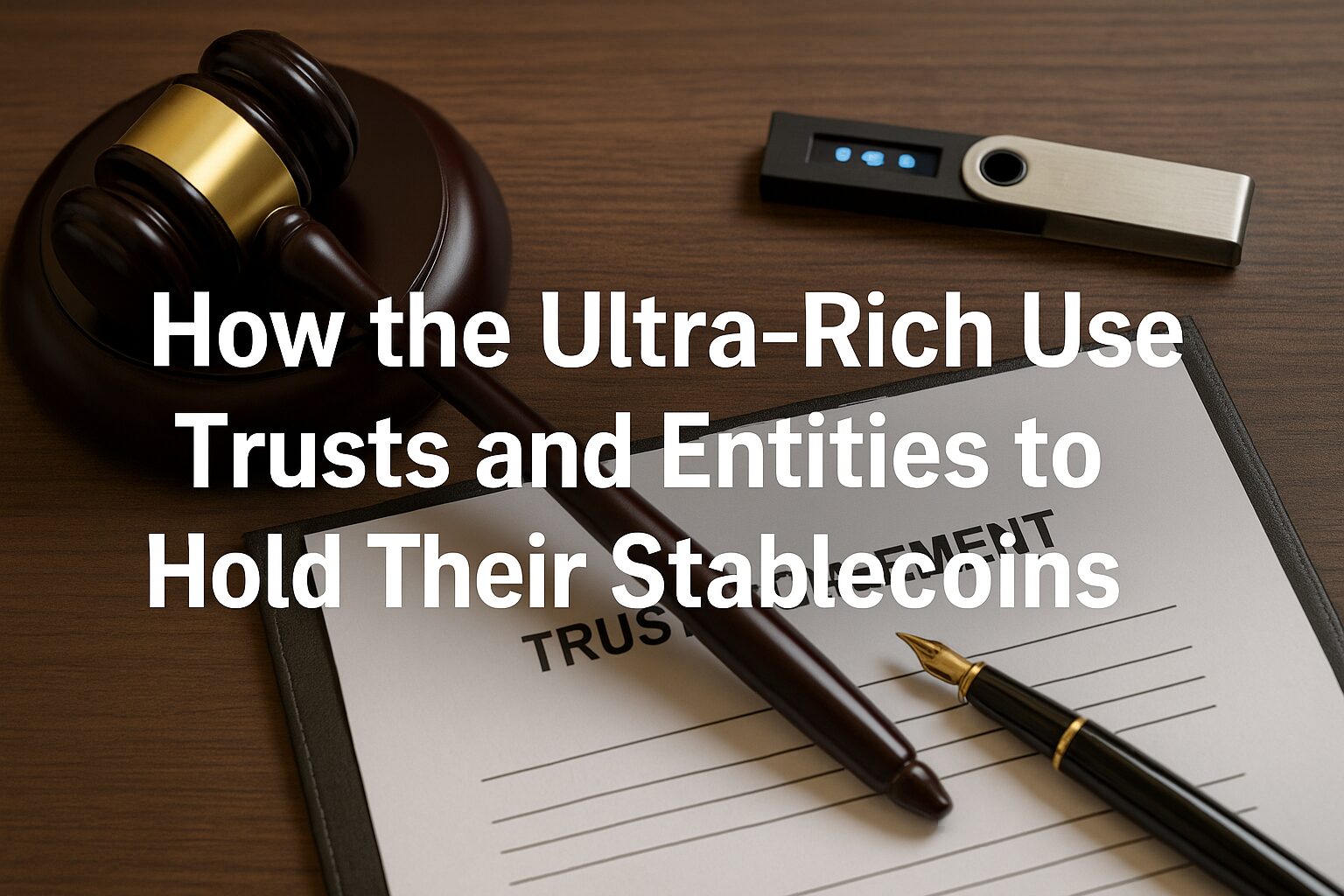📌 Opening Preview
How the Ultra-Rich Use Trusts and Entities to Hold Their Stablecoins
→ In this post, we uncover the exact legal vehicles that wealthy investors use to hold stablecoins — from offshore trusts and LLCs to nominee directors and asset protection foundations.
In the world of digital assets, stablecoins are the ultimate bridge between the legacy financial system and the decentralized world. But for the ultra-rich, holding stablecoins is not as simple as storing them in a wallet. The wealthy leverage sophisticated legal structures — trusts, LLCs, IBCs, and foundations — to preserve anonymity, reduce liability, and maximize tax efficiency.
This post explores the exact methods used by crypto millionaires and billionaires to structure their stablecoin holdings, ensuring both compliance and protection in a rapidly shifting regulatory landscape.
1. Why the Rich Don’t Hold Crypto in Their Own Name
Holding stablecoins in one’s personal name exposes the owner to:
- Taxation in their home country
- Lawsuits and asset seizure risks
- Disclosure obligations and KYC scrutiny
For this reason, the ultra-wealthy prefer to distance themselves legally from the assets while maintaining effective control. The strategy: legal separation through entities and trusts.
2. Offshore LLCs and IBCs: A Simple Start
Many begin with Limited Liability Companies (LLCs) or International Business Corporations (IBCs) registered in crypto-friendly jurisdictions such as:
- Nevis
- Panama
- British Virgin Islands
- Wyoming (USA)
These entities:
- Can open exchange accounts and custody wallets
- Allow ownership via nominee directors
- Enable tax advantages depending on local laws
- Offer legal distance from the personal identity of the UBO (Ultimate Beneficial Owner)
Example: A Nevis LLC opens an account on a decentralized custody platform. The owner controls the LLC but is not directly tied to the funds in most legal contexts.
3. Trusts: The Next Layer of Protection
Trusts are powerful legal arrangements where a trustee manages assets for the benefit of a beneficiary. For stablecoin holders:
- Cook Islands Trusts are among the most impenetrable, offering protection even in case of foreign judgments.
- Belize and Liechtenstein trusts are also popular.
- Trusts can be irrevocable for maximum protection or revocable if more flexibility is desired.
Why the rich use them:
- Avoid probate and estate taxes
- Shield assets from lawsuits and divorce settlements
- Separate legal ownership from beneficial control
When combined with offshore entities, trusts become nearly bulletproof in asset protection terms.
4. Private Foundations: Control Without Ownership
Foundations, such as those in Panama or Liechtenstein, are legal persons that can hold assets, open bank or crypto accounts, and have their own governance.
They are useful when the asset owner wants:
- No named owner
- A governance structure independent of themselves
- A succession plan without inheritance complications
They are especially useful when combined with trusts — i.e., a foundation owns an LLC, and a trust owns the foundation.
5. Multi-Jurisdictional Structures: The Billionaire Playbook
The most sophisticated stablecoin structures often involve:
- A Cook Islands Trust
- Owning a Liechtenstein Foundation
- That controls a Panama IBC
- Which holds multiple wallets and exchange accounts
This layered approach makes it nearly impossible for governments or creditors to track or seize funds — assuming legal compliance and ethical practices.
This complexity also offers:
- Regulatory arbitrage
- Redundancy in legal protection
- Enhanced privacy
6. Compliance Is Not Optional
While the above strategies offer protection and tax advantages, the ultra-wealthy always work with:
- Top-tier tax attorneys
- Crypto compliance advisors
- AML/KYC experts
Why? Because regulatory authorities are catching up, and penalties for improper offshore declarations can be catastrophic. Legal structure ≠ tax evasion. These tools are used to legally minimize exposure, not to break the law.
7. Who Sets These Up?
If you think these structures are only for billionaires — think again. Today, successful entrepreneurs, digital nomads, and crypto millionaires increasingly set up these tools, especially when:
- Net worth exceeds $500K+
- They operate internationally
- They live in high-tax jurisdictions (like the U.S., U.K., Canada, or Korea)
Service providers range from Caribbean trust companies to Swiss asset structuring firms to specialized crypto attorneys.
8. What About U.S. Citizens?
U.S. persons have strict reporting obligations (e.g., FBAR, FATCA). But even so, legal structures are widely used to:
- Reduce estate taxes
- Create non-grantor trusts
- Use foreign disregarded entities for business and holding
The key is reporting everything correctly — while still leveraging legal advantages.
9. Risks and Limitations
Despite their power, these structures come with:
- Setup costs (anywhere from $10K to $100K)
- Annual maintenance fees
- Increased scrutiny from banks and exchanges
- Complex legal filings
Moreover, if abused for money laundering or tax evasion, they can trigger criminal penalties.
10. Is It Worth It?
If your goal is to build intergenerational crypto wealth — and protect it from regulators, lawsuits, or economic collapse — the answer is yes.
But it requires:
- Long-term planning
- Professional guidance
- A mindset of compliance-first strategy
Final Thoughts
Stablecoins are here to stay. But how you hold them will determine how much of that wealth survives legal, political, and regulatory threats.
The ultra-rich don’t just buy assets — they structure their ownership. If you want to play the same game, start learning from their playbook now.
📌 Coming Up Next
Should You Renounce Your Citizenship to Save Crypto Taxes?
→ In our next post, we dive into the world of “citizenship exit plans” — from St. Kitts to Vanuatu. When, why, and how the crypto rich are giving up passports for ultimate financial freedom.
